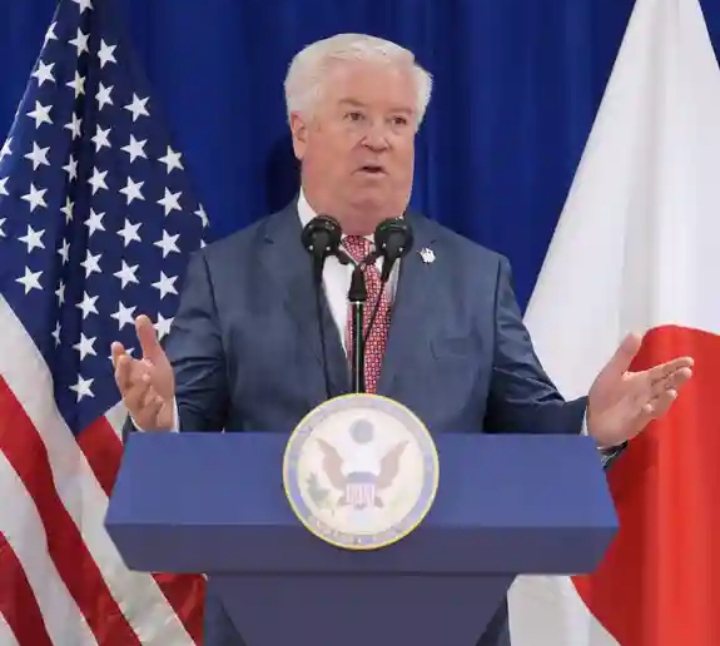U.S. Ambassador George Glass called for stronger U.S.-Japan defense ties to counter China, while Japan negotiates tariff reductions and increased payments for hosting U.S. troops. China defended its role in global peace.
US Envoy Urges Japan to Strengthen Defense and 'Push Back' Against China


The United States and Japan must enhance their defense cooperation in response to an increasingly confrontational China, according to George Glass, the new U.S. ambassador to Tokyo, during his arrival in Japan on Friday.
In recent years, Tokyo has initiated a historic military buildup and has embarked on various projects with Washington to strengthen their military forces and align their defense sectors more closely.
At the same time, Japan is also negotiating its way out of the tariffs imposed by the Trump administration. Although a 90-day pause temporarily spared Japan from the 24% across-the-board tariffs, a 10% baseline tariff, and a 25% tax on imported cars, auto parts, steel, and aluminum exports still remain in place.
"I've met now with most of the principals who are in the room and doing the negotiating... I'm extremely optimistic that a deal will get done," Glass said.
Glass emphasized that the United States was focused on ensuring the safety of both U.S. and Japanese citizens, as well as making sure the military has the necessary support and materials to counter Beijing’s increasing assertiveness.
"We sit with Japan in a very tough neighborhood. You have Russia, you have China, and you have North Korea," Glass told reporters at Tokyo’s Haneda airport, stressing the need for the allies to "push back against a country like China."
"This is currently a partnership between the United States and Japan that is a powerful force for peace, a powerful force for prosperity, and a powerful force for progress in the region," Glass added.
The Chinese Foreign Ministry did not immediately respond to a request for comment on Glass’s remarks. However, Chinese Foreign Ministry spokesperson Lin Jian responded by saying that diplomats should promote friendship between countries, rather than tarnish relations with negative rhetoric.
Lin also emphasized that China has been a force for international peace and questioned who was truly responsible for flaunting military might, provoking confrontation, and threatening peace globally.
"Who is flaunting military force, provoking confrontation, and threatening peace everywhere?" Lin asked during a regular press briefing. "The international community has never been clearer about this."
Meanwhile, U.S. President Donald Trump has repeatedly expressed his dissatisfaction with the cost of defense alliances, including those with Japan. Japan hosts the largest overseas deployment of U.S. troops and is home to squadrons of U.S. fighter jets as well as Washington’s only forward-deployed aircraft carrier strike group.
During his ambassadorial confirmation hearing in March, Glass mentioned that he would need to encourage Japan to contribute more to the costs associated with hosting U.S. military forces.
Trump reportedly wants Japan to increase its financial contribution for hosting 54,000 U.S. troops, primarily based in Okinawa. Currently, Japan pays approximately $1.4 billion (over €1.2 billion) annually to maintain the U.S. military presence. The U.S. president wants these cost discussions to be incorporated into ongoing trade negotiations, which were sparked by his sweeping import tariffs on numerous countries, including Japan.
Glass, a prominent businessperson with a background in finance, investment banking, and technology, is also a former ambassador to Portugal.

 বাংলা
বাংলা  Spanish
Spanish  Arabic
Arabic  French
French  Chinese
Chinese 
